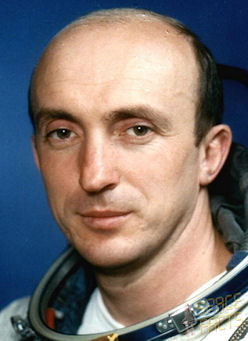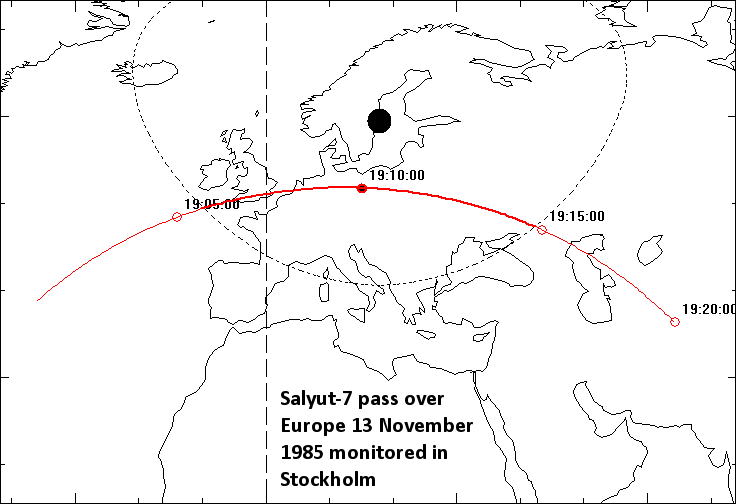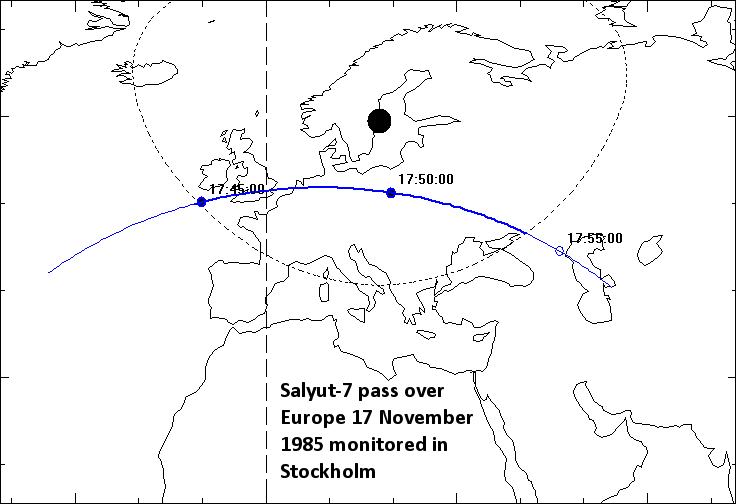Cosmonaut Vladimir Vazyutin - a different
kind of space hero
Sven
Grahn
 Most
spaceflight enthusiasts have heard about the Soviet cosmonaut that became so ill
in orbit that his whole crew had to return to earth before they had completed
what they were launched to accomplish. The returning crew in question consisted
of the commander Vladimir Vasyutin, Viktor Savinykh, and Alexander Volkov. They
returned to earth from the orbital station Salyut-7 on 21 November 1985 after
the commander Vasyutin had fallen ill. Initially, reports about the problems
encountered by the crew on Salyut-7 only mentioned unspecified “illness” and
that Vladimir Vasyutin was hospitalized after his return to earth. Later, more
details emerged (2) (3) and the medical problems
were described as prostate infection and inflammation, i.e. prostatitis. His
crewmate, Viktor Savinykh, has also described the physical discomfort (a fever
of 40 °C) and bouts of deep depression that Vasyutin had to endure.
Most
spaceflight enthusiasts have heard about the Soviet cosmonaut that became so ill
in orbit that his whole crew had to return to earth before they had completed
what they were launched to accomplish. The returning crew in question consisted
of the commander Vladimir Vasyutin, Viktor Savinykh, and Alexander Volkov. They
returned to earth from the orbital station Salyut-7 on 21 November 1985 after
the commander Vasyutin had fallen ill. Initially, reports about the problems
encountered by the crew on Salyut-7 only mentioned unspecified “illness” and
that Vladimir Vasyutin was hospitalized after his return to earth. Later, more
details emerged (2) (3) and the medical problems
were described as prostate infection and inflammation, i.e. prostatitis. His
crewmate, Viktor Savinykh, has also described the physical discomfort (a fever
of 40 °C) and bouts of deep depression that Vasyutin had to endure.
At the time, Aviation Week
(1) reported that there had been signs of trouble in
orbit when radio transmissions from Salyut-7 had been scrambled starting on 13
November 1985 and lasting four days. Aviation Week cited the “Kettering Group” as the
source of these reports about scrambled radio transmissions. Actually, these
reports came from me through the leader of the Kettering Group, Geoff
Perry, who regularly was in touch with journalists at Aviation
Week. I recorded these scrambled transmissions on 142.417 MHz on the following
occasions:
-
13
November 1985, 1909:05-1913:40 UT
-
17
November 1985, 1748:20-1752:40 UT
First unscrambling
The first
“scrambled” transmissions of the type encountered here were recorded from
Salyut-6 in 1978 and were “descrambled” by Richard Flagg and myself using
a descrambling system consisting of an analog multiplier chip, a tunable
audio-frequency oscillator, and a tunable low-pass filter (see article). The scrambling was really
simple, just an inversion of the audio spectrum, and intended as a very simple
way of hiding a crew member’s private conversations from the ears of colleagues
in space or on the ground. Soviet media even published a few stories about this
system. The 1978 recording was
all about a very trivial incident – the cosmonauts were complaining about
not finding sleeping pills they had asked for in the cargo of a newly
arrived Progress transport ship.
Indeed, there were
several more occasions over the years when I picked up such scrambled voice
signals. But I had not kept the little circuits that descrambled the signals so
these recordings just sat on tape cassettes in my
drawers.
Deep in the
archives
Recently, however,
I decided to digitize all my satellite signal recordings and of course ran
across the two scrambled recordings from Salyut-7 in November 1985. I decided to
make another attempt a descrambling them, but this time using software only. In
theory, it is possible to invert the audio spectrum by changing the sign of
every other sample in the audio file. But, being a bit lazy, I realized that
with my software coding skills, this would take many hours of coding. Instead I
was seeking a simpler solution. An ex-colleague of mine advised me to check
if the Audacity
audio editor could be used. I already had installed Audacity for another purpose
and was aware that it was possible to build simple audio processing functions in
Audacity by using a LISP-like language called “Nyquist”. The code lines of
Nyquist can be entered in a simple code window. BUT, I had really no idea of how
to do it.
Help from Messrs Nyquist and
Kozin
To get some help,
I registered in the Audacity user forum and sent a question on how to invert the
audio spectrum and included a link to the 1978 descrambling of signals from
Salyut-6 mentioned above. Within an hour I got a very kind reply on this forum
giving me a Nyquist code line that emulated in code what Richard Flagg and I had
done in hardware 36 years earlier. The replier had even included a newly
descrambled version of one of the 1978
files.
The Nyquist code
line reads like this:
(lowpass8 (mult 2 (highpass8 s 300) (hzosc 3763))
3100)
To
understand this
one should work “from the inside out”. “hzosc 3763” means an oscillator at 3763
Hz. "Highpass8 s 300” means that the signal “s” is high-pass filtered with an
8-pole Butterworth filter with a lower cut-off frequency of 300 Hz. The function
“mult” multiplies the high-pass filtered signal with the oscillator signal
and the factor “2” (can be varied so as to get adequate amplitude). Lowpass8
(…) 3100 then low-pass filters the resulting signal with a cut-off frequency
of 3100 Hz. The high-pass filter is used to reduce any audio noise
components, like power-line hum that may be converted into high-frequency noise
by the inversion process. Otherwise, the code line reproduces exactly the
hardware that Richard Flagg and I built in
1978.
This code line
certainly descrambled to voice. Here is an example from the 13 November 1985
recording:
Scrambled part
as it sounded
scrambled:
And here it is
descrambled
.
As anyone can
hear it is not easy to pick out individual words, especially for someone who
does not speak Russian fluently. The old descrambled recording from 1978 was
translated for me by Gene Kozin about 15 years ago. I had lost the address of
Gene in the intervening years, but I had no problems locating him again. I sent
the two descrambled recordings to him and eagerly awaited the result. And – just
like with the old recording – he showed a remarkable ability to penetrate the
noise and distortion to understand and translate the
voice.
The 13 November 1985
recording

The speaker on
the space station is not Vasyutin, but another crew member, probably Viktor
Savinykh. The person on the other end, Viktor Dmitriyevich, is probably flight
controller Viktor Blagov. Slava Zudov refers to Soyuz-23 cosmonaut Vyacheslav
Zudov, while Georgiy Timofeyevich probably is Soyuz-3 cosmonaut Georgiy
Beregovoy.
-
Okay then, let’s first now talk about work with Viktor
Dmitriyevich. Viktor… Viktor Dmitriyevich, perhaps this, we have a conversation
such that, let’s switch over to... to the third.
[Scrambled portion]
-
So…I
mean… at least some general environment… because everything have gotten somehow
not very… and… [Second voice: just wait]. I mean, every day we have visitors…
with conversations. Yesterday Slava Zudov, today Georgiy Timofeyevich. Of
course, we love and respect them very much, but at this particular moment, such
conversations, I mean… affect [sighs] Volodya, in not… not the best
way.
[Unintelligible]
-
This is
not... [Static] …now to talk about… This is not support. This is the opposite,
Victor Dmitriyevich. And I’m asking you, I mean, all these visits, like this,
aside from family… We are here … [unintelligible] …with Volodya and I said,
“Maybe we should cancel family visits too?” But no, let them continue. But the
visits like these, I mean, with phrases like “Hang on there… ” This is …
unnecessary. That is good. So, if some of the guys come, I mean from the
regiment, I mean youngsters… I mean, on business or something like that, but
without this kind of… conversations.
[Unintelligible]
-
Yes. I
mean, in general this is not… not… not… improving. The fact that I indeed…
[Static]…strength, that is… [Static] ...now the great difficulty does indeed
exist.
[Unintelligible]
-
He’s holding on. But for how long, I mean, and how it’s going to
be, I mean, this second treatment cycle is going to end, there’s nothing I can
say.
[Unintelligible,
static]
-
Yes.
[Unintelligible]
-
I mean,
he’s got strength. For how long it will last, there’s nothing I can say, Viktor
Dmitriyevich. How is the situation in general on your
side?
[Unintelligible]
-
I mean,
on the twenty first… [Unintelligible] ...certainly he’s not ready, right? For…
[Unintelligible]
-
...to
do, for example.
[Unintelligible]
-
That’s
understood.
[Unintelligible, static]
Clearly,
Vasyutin’s mood was not very good and he was even disturbed by well-wishers
talking to him from Mission Control in Moscow. One can only wonder if the
mention of “… on the twentyfirst …” refers to a possible landing on 21 November.
The 17 November 1985
recording

The
speaker in this recording is Vladimir Vasyutin himself. The identity of Anatoliy
Dmitrievich is unclear. “Sasha” is of course crew member Alexander
Volkov.
-
Good, or
not so good... evening.
[Unintelligible]
-
And I am
about you, Anatoliy Dmitrievich.
[Unintelligible]
-
Yes.
[Unintelligible, static]
-
Umm…today, at seventeen o’clock…
[Unintelligible, static]
-
Here it
is, for Sasha thirty-six five, for myself thirty-six nine. Thirty six and nine,
thirty six and five. Understood. Ok, now …
[Unintelligible, static]
-
General
condition… Umm, before lunch, I again felt… I mean...
nauseated.
[Unintelligible]
-
Umm …
there was vomiting, but such as… I could not throw up anything, because before
lunch only bitter pears (?), that’s all.
[Unintelligible]
-
Yes, but
I did not vomit food. No, today I did not feel chills.
[Unintelligible]
-
Pain in perineum still remains. Umm… in that channel
where… as usual, on the same note.
[Unintelligible]
-
Yes, I
also feel it in the groin.
[Unintelligible]
-
Yes,
when I bend my legs towards my stomach it gets a little
stronger.
[Unintelligible]
-
Umm… today I tried to get on the [unintelligible], eh… started
walking, but I got invited here, right away, for the communication,
and…
Symptoms
Vasytuin’s temperature was rather normal on 17 November 1985 even
though it was about 0.4 °C higher than that of his crewmate. By checking on-line
medical sites it is easy to determine that the symptoms that Vasyutin gives –
pain in the perineum and
the groin is typical of prostatitis. So, doctors on the ground should have been
rather convinced as to what was the problem. Why could he not be treated with
antibiotics? Surely, the space station supplies must have contained antibiotics.
It seems, however, that acute prostatitis initially is treated by administering
antibiotics intravenously. Perhaps this was not possible to do in
orbit.
Summary
Space travelers that
achieve hero status often make daring space walks, landing on other heavenly
bodies or narrowly escaping death. But, in my book, Vladimir Vasyutin should be
given a special place in the Hall of Fame. He suffered very much from illness
while in space. Some of his colleagues said he hid his ailment before launch and
it got worse in flight. Can all astronauts honestly say they are innocent of
this very human behaviour? The final result was bad for Vladimir Vasyutin and he
paid dearly for any wrong-doing and probably felt that he had failed his crew,
the space program and his nation badly. But the odds were against him. Still, he
fought valiantly and stayed about 65 days in orbit during his only space
mission. He retired from cosmonaut duty for medical reasons in 1987. I feel much
sympathy for him. Life can be very tough.Vladimir
Vasyutin, space hero, passed away in 2004, at the age of fifty. I think he is
well worth remembering.
Acknowledgements
Thanks go
to my ex co-worker, Hans Ringstrand, for having the hunch of trying Audacity for
the spectrum inversion. Special thanks to Gene Kozin for his brilliant and
prompt “decoding” of the unscrambled recordings.
References
-
-
-
"Illness in orbit", Bart Hendrickx,
Spaceflight, Vol 53, March 2011.

 Back to space tracking
notes
Back to space tracking
notes
 Most
spaceflight enthusiasts have heard about the Soviet cosmonaut that became so ill
in orbit that his whole crew had to return to earth before they had completed
what they were launched to accomplish. The returning crew in question consisted
of the commander Vladimir Vasyutin, Viktor Savinykh, and Alexander Volkov. They
returned to earth from the orbital station Salyut-7 on 21 November 1985 after
the commander Vasyutin had fallen ill. Initially, reports about the problems
encountered by the crew on Salyut-7 only mentioned unspecified “illness” and
that Vladimir Vasyutin was hospitalized after his return to earth. Later, more
details emerged (2) (3) and the medical problems
were described as prostate infection and inflammation, i.e. prostatitis. His
crewmate, Viktor Savinykh, has also described the physical discomfort (a fever
of 40 °C) and bouts of deep depression that Vasyutin had to endure.
Most
spaceflight enthusiasts have heard about the Soviet cosmonaut that became so ill
in orbit that his whole crew had to return to earth before they had completed
what they were launched to accomplish. The returning crew in question consisted
of the commander Vladimir Vasyutin, Viktor Savinykh, and Alexander Volkov. They
returned to earth from the orbital station Salyut-7 on 21 November 1985 after
the commander Vasyutin had fallen ill. Initially, reports about the problems
encountered by the crew on Salyut-7 only mentioned unspecified “illness” and
that Vladimir Vasyutin was hospitalized after his return to earth. Later, more
details emerged (2) (3) and the medical problems
were described as prostate infection and inflammation, i.e. prostatitis. His
crewmate, Viktor Savinykh, has also described the physical discomfort (a fever
of 40 °C) and bouts of deep depression that Vasyutin had to endure.
